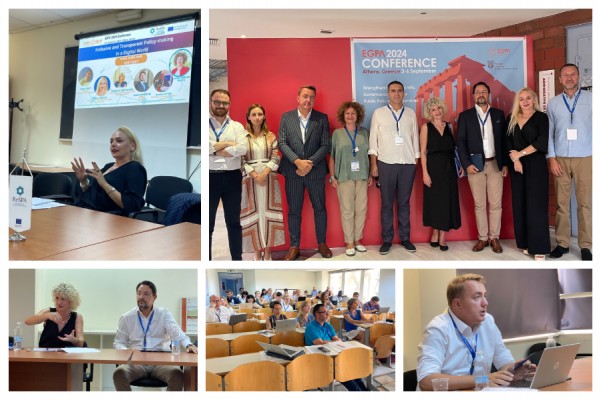
ReSPA Panel at the EGPA 2024 Conference: Insightful Discussion About the Potential of Digital Tools in Enhancing Inclusivity and Transparency Across the Policy-Making in the Western Balkans
5 September 2024, Athens, Greece
One of the key highlights of the EGPA 2024 conference was today's panel discussion on "Inclusive and Transparent Policy-Making in a Digital World." Nedžib DELIĆ, Public Administration Reform Coordinators Office - Cabinet of the Chairman of the Council of Ministers, Bosnia and Herzegovina, Lidija LJUMOVIĆ, Director General for CSO Development and Cooperation, Ministry of Public Administration, Montenegro, Gordana GAPIKJ DIMITROVSKA, State Advisor, Ministry of Digital Transformation, North Macedonia, Danilo RONČEVIĆ, Director of Human Resources Management Service, Serbia and Qendrim BYTYQI, Acting Head of the Department for Management of Public Officials, Ministry of Internal Affairs, Kosovo*[1]presented current practices in their respective administrations, focusing on analytical tools and techniques for data collection and analysis that support evidence-based policymaking (such as open data portals or overview of statistical data on key indicators used in strategic documents), E-government platforms that enhance citizen engagement and participation in policymaking and platforms for coordinating and monitoring policy implementation (such as IT tools used to monitor PAR Strategy implementation).
They also identified challenges, shared best practices, and considered future trends and innovations in the digital policy-making landscape. Looking ahead, discussions centred on the transformative potential of emerging technologies like AI and big data in shaping future policy-making landscapes. ReSPA pledged its support in helping member states adapt public institutions to these advancements.
Jelena MRDAK, ReSPA Programme Manager highlighted: “Today's discussion spotlighted the Western Balkan administrations' significant effort in using digital tools to foster more inclusive and transparent policy-making. We've exchanged the successes of various digital platforms while delving into the challenges. This insightful discussion underscored a crucial need for ongoing collaboration across the Western Balkans to strengthen democratic governance driven by ReSPA”.
Looking ahead, it’s clear that emerging technologies like AI and big data have the potential to revolutionise how we design and implement policies. But to fully harness these tools, we must ensure that our public institutions are prepared to adapt and innovate. I encourage all of us to continue sharing experiences and best practices within our own administrations and across the region. Together, we can overcome the challenges and ensure that digital tools contribute to more effective and inclusive governance.
[1] * This designation is without prejudice to positions on status, and is in line with UNSCR 1244 and ICJ opinion on the Kosovo Declaration of independence.
The 2024 European Group for Public Administration (EGPA) Conference, hosted by Panteion University of Social and Political Sciences in Athens, brought together more than 550 academics, researchers, and practitioners in public administration.
The opening ceremony, titled "Strengthening Democratic Governance for Enhanced Public Policies and Services," was chaired by Prof. Jean-Michel Eymeri-Douzans, President of EGPA and Professor at Sciences Po Toulouse. The session featured addresses from leading figures in the field.
Prof. Dr. Christina Koulouri, Rector of Panteion University, and Dr. Ra'ed Ben Shams, President of the International Institute of Administrative Sciences (IIAS), delivered Welcoming remarks.
Keynote speeches followed, including an insightful address by Ms. Paraskevi (Vivi) Charalaboyianni, Deputy Minister of the Greek Ministry of the Interior, emphasizing the importance of transparent governance and accountable public services. Contributions from Prof. Demetrios Argyriades of Panteion University and Dr. Marcel Guenoun, an expert in public sector transformation from France, further underscored the crucial role of innovation in democratic governance.



